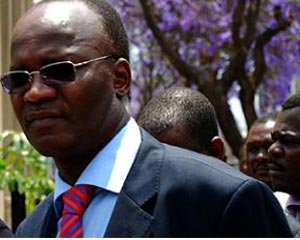
Media, Information and Broadcasting Services minister, Professor Jonathan Moyo yesterday blasted the police for using unconstitutional and counterproductive means to block journalists and other stakeholders in Harare from commemorating the traditional World Press Freedom Day.
BY PATRICE MAKOVA and NQOBILE NKIWANE
A World Press Freedom Day march and roadshow jointly organised by the Media Alliance of Zimbabwe (MAZ), Zimbabwe Association of Community Radio Stations (Zacras) and other stakeholders was supposed to take place in the morning and had been granted police clearance on March 16.
But media stakeholders were shocked when scores of anti-riot police officers stopped them from marching from the corner of Chinhoyi Street and Robert Mugabe to Africa Unity Square, the venue for the main commemorations.
An angry Moyo said the cancellation without prior consultation with the stakeholders involved including his ministry and on the basis of “opaque” reasons was very disappointing as it was neither in the public nor national interest.
He said the move was patently unconstitutional and without any transparent, rational and constructive justification.
“It should be placed on record that the kneejerk propensity to always and everywhere use or show force for its own sake is not revolutionary by any stretch of imagination,” said Moyo.
“In point of fact, that propensity can be quite reactionary and even subversive. The use or show of force should always and everywhere have a transparent and constitutionally and rationally justifiable purpose.”
- Chamisa under fire over US$120K donation
- Mavhunga puts DeMbare into Chibuku quarterfinals
- Pension funds bet on Cabora Bassa oilfields
- Councils defy govt fire tender directive
Keep Reading
Moyo said experience had shown that the use of force to instill fear or to display power could lead to unintended consequences. “In any case there is no virtue or gain in fear. That is why it is far better to always seek to instill hope that to induce fear,” he said.
The Media minister said stakeholders, especially the police, should understand that the new constitution that came into effect with the inauguration of President Robert Mugabe in August last year, guaranteed media freedom and nobody had the right or option to ignore this fundamental right.
He blamed vested political elements for the 11th hour cancellation of the commemorations, and insinuated that only time would tell what and where things were going wrong in the country.
Moyo expressed his appreciation for the role the national media was playing in the country. He promised that in liaison with Unesco and other stakeholders, the “unduly” cancelled event would be rescheduled.
MAZ and Zacras also convened an emergency press conference to condemn the last minute cancellation of the commemorations observed worldwide annually on May 3.
Zacras chairperson, Gift Mambipiri said the ban flew against the spirit of press freedom and was in violation of the provisions of the new constitution and comes at a time when the Information and Media Panel of Inquiry (IMPI) was conducting countrywide visits to gather citizens’ views on the state of media in the country. “Telling the Zimbabwean story has never been easy. We have always had to negotiate through difficult pieces of legislation,” said Mambipiri
Mambipiri said the current constitution spelt a good era for journalism but it was not going to be easy to enjoy its provisions.
“Media freedom will not flow from section 61, we need to demand it so that we liberate the press in Zimbabwe,” he said.
The Zacras chairperson however said yesterday’s event should not distract the media from celebrating the work that it has been doing.
The letter banning the World Press Freedom Day march was dated May 2 and stamped May 3.It was signed by Officer Commanding Harare Central District, a Chief Superintendent N Saunyama.
“This office kindly regrets that our earlier approval of the event has been withdrawn due to cropping up of other events of national interest and our police officers will be committed to such events,” reads the letter.
But Mambipiri described the withdrawal as a well-planned and calculated manoeuvre to make sure journalists did not come together.










